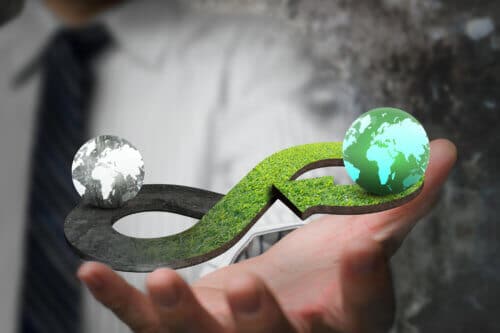A team of experts suggests introducing a kind of Green New Deal in Israel as well to create jobs and increase growth and stability in the economy while reducing the damage of the climate crisis

With the deployment of the year 2021 upon us (for the better), and despite the renewed increase in morbidity and the difficulties of the third lockdown, following the corona virus (SARS-CoV-2), there is a kind of cautious optimism for a brighter future. The vaccine is supposed to stop the spread of the epidemic, but even if it succeeds, it will still be necessary to restore the heavy economic damages caused by the crisis it brought with it, and to restore the Israeli economy.
This week the Economy Committee in the Knesset discussedA detailed plan which includes measures designed to rescue Israel's economy from the crisis, create jobs and increase growth and stability in the economy in the long term - through investment in reducing the damage of the climate crisis and protecting the environment in Israel. The program was written by a team of experts from the fields of economics, politics and the environment.
The idea of a "Green New Deal", an in-depth program aimed at combating the climate crisis through investments in a green economy, is not new: long before the Corona crisis, US Congresswoman Alexandria Ocasio-Cortez and Senator Ed Markey (both representatives of the Democratic Party) presented such a plan for the United States , and various measures on the subject have also been proposed and carried out in other countries in the world, including Great Britain, Australia and South Korea.

However, one of the main barriers facing such measures is the fact that in many cases they require a significant financial investment. Therefore, the exit from the corona crisis may be an opportunity to act for a better environment. A wise investment in environmental fields entails a significant employment potential and the return of the capital invested in it in high percentages.
The rescue plan from the corona crisis that was approved in the European Union mainly includes investments in green infrastructures for the purpose of creating jobs. In addition, the OECD organization Call the countries that are members of it Build their economic recovery plans so that they encourage sustainability and strengthen the resilience of the country in the face of the damage of the climate crisis. The US president-elect, Joe Biden, also presented An ambitious plan In the amount of trillions of dollars to get out of the crisis by accelerating processes that benefit the environment, while creating a large number of new jobs.
green extraction
By the way, they are not the only ones who think that the solution lies in green extraction. Also the World Bank, the World Economic Forum (WEF), the International Energy Agency (IEA) and the International Monetary Fund (IMF). Even the Prime Minister of Great Britain, Boris Johnson, recently published his green bailout plan to the extent of 18 billion pounds, and like him, the governments of Canada, Germany, France and New Zealand also published similar plans.
And where are we in all this story? Good question. Precisely for this purpose, in recent months "Life and Environment" - the umbrella organization of environmental organizations in Israel, the Israeli Association for Ecology and Environmental Sciences, the Israel Democracy Institute and a collection of experts in various fields - have come together and developed the Green Rescue Plan for Israel. The plan asked to check how to leverage the existing crisis for a rescue that will lead to acceleration and future development.
During the work process, over 200 proposals were collected, each of which was examined in depth, with the help of senior economists. The leading idea was to choose measures that, according to world experience, create many jobs and that return the investment quickly, with a return. Therefore, the plan details how to restart the economy with a square profit: creating jobs, building proper infrastructure, quickly returning the investment and contributing to the environment instead of harming it.

The new plan, the total cost of which is NIS 8.3 billion, consists of measures for which a budget is required (the cost of which is detailed therein), as well as regulatory measures. Most of the sections of the plan are based on government moves that are currently in the planning stages and have been coordinated with the relevant ministries. Some of the proposals relate to issues that affect the entire economy, and others to specific areas.
The renewable energies create jobs
The world is going in the direction of adopting green, sustainable growth, with an increase in the use of renewable energies, and the workers will be able to be absorbed in these sectors, which will gain momentum after the crisis. There is a very wide variety of professions related to solar energy, for example, such as planning, panel production, assembly, maintenance and more. This is an entire industry in which the number of people engaged in is relatively small at the moment and which we see that there will be a great demand for workers.
Another branch that will be profitable is the field of public transportation and investment in it: investment in drivers, system operators, planners, etc. All this alongside investing in a program to promote the use of bicycles and upgrade cycling paths.
The plan also includes measures in the field of urban planning. One of them concerns the housing crisis, and it is proposed to budget for urban renewal projects of entire complexes.
Another area the program deals with is energy. The steps in this regard include, among other things, accelerating the upgrading of the electricity grid, so that it can properly absorb renewable energy into it - a move that also includes upgrading the electricity meters, so that, among other things, they will allow the consumer to sell electricity to the grid (such as, for example, from the solar panels on the roof of his house). Another step included in the program is the granting of state-guaranteed loans for the establishment of solar energy infrastructures and for research and development on topics such as renewable energy storage.
A proposal to leverage investments
This week, as mentioned, there was a discussion in the economy committee, led by MK Yaakov Margi, chairman of the committee, who dealt with the key points in the plan. If we opened the column with a hint of optimism about the year 2021, we can only hope that this discussion and those that will follow it will encourage the government ministries to adopt the plan and see it as a proposal to leverage investments that will yield a double profit in the near future, both for the economic rehabilitation of the economy and for the health of the environment in which we live and plan to live for many more years.
the post How will Israel leverage the Corona crisis? appeared first onangle
More of the topic in Hayadan:
